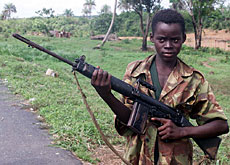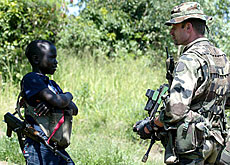Nations adopt new rules on child soldiers

Switzerland joined dozens of countries in Paris on Monday to step up efforts to ease the plight of up to 300,000 child soldiers around the world.
Both the government and a Swiss-based charity assisted in revising international guidelines on children caught up in armed conflict that will be adopted in the French capital, Paris.
According to the Swiss foreign ministry, the issue of child soldiers remains “grave” despite efforts by the international community over the past few years to find solutions.
Ambassador Anton Thalmann, who will be leading the Swiss delegation in Paris, told swissinfo that progress had been made in disarming, demobilising and reintegrating children exploited in armed conflicts.
But he said the “dire reality on the ground in many conflict zones” demanded even more attention from governments, international organisations and civil society to end what he said were grave human rights violations.
“In line with its humanitarian tradition, Switzerland is very much concerned about the fate of war victims, in particular children, who are especially vulnerable to the consequences of armed conflict,” he said.
Even though the so-called Paris Principles are not legally binding, Thalmann hopes they will provide a strong basis for improved collaboration and lead to better protection of children.
Priority areas include the prevention of recruitment, release and reintegration, and the specific needs of girls caught up in armed conflict.
Juvenile justice
The two-day conference comes ten years after the United Nations Children’s Fund, Unicef, and non-governmental organisations developed a first set of standards, known as the Cape Town Principles.
The Lausanne-based NGO Terre des hommes (Tdh), which has provided input in two areas – juvenile justice and case management of children – said an updated set of guidelines would enable more effective action in the field.
“At government level I know that in the past five years some energy has been put in – by the Swiss government among others,” said Ignacio Packer, head of programmes. “But the situation hasn’t really improved; we are still using the same figure – 300,000 – as ten years ago.”
However, Packer said the Paris conference did mark an important step, adding that if the standards were implemented there would be considerable improvement.
In the dock
Swiss involvement in the process comes a year after the government had its knuckles rapped by the UN Committee on the Rights of the Child for not doing enough to bring recruiters of child soldiers to justice.
An amendment to the Military Penal Code, which came into force in June 2004, states that suspected war criminals must have a “close link” to Switzerland in order to face prosecution.
The clause covers suspects owning property or with relatives in the country, but not those who are simply passing through.
The Geneva-based justice organisation Trial and around 60 legal experts in Switzerland challenged the loophole, which they say runs contrary to international law.
The amendment has since been under review and a report is expected to be submitted to the government within the next few weeks.
“The information we have is that they are going to change it,” said Trial’s president Philip Grant.
swissinfo, Adam Beaumont
Switzerland supports a number of organisations and projects that aim to protect children in situations of armed conflict, prevent violations of children’s rights, and support reintegration.
These include the International Committee of the Red Cross, Unicef, the Office of the High Commissioner for Refugees and the Coalition to Stop the Use of Child Soldiers
The Swiss foreign ministry says it is active on the issue within the main UN bodies, as well as supporting the work and mandate of the Special Representative to the Secretary General for Children and Armed Conflict.
1989: Convention on the Rights of the Child bans the recruitment and use of children under 15 in armed conflict.
1997: Adoption of the Cape Town Principles
1998: Creation of the Coalition to Stop the Use of Child Soldiers, whose founding members include Terre des hommes.
2002: Optional protocol to the Convention on the Rights of the Child raises the minimum recruitment age to 18.
2002: The International Criminal Court defines as a war crime the drafting or involvement of children under 15 in armed conflict.

In compliance with the JTI standards
More: SWI swissinfo.ch certified by the Journalism Trust Initiative

You can find an overview of ongoing debates with our journalists here. Please join us!
If you want to start a conversation about a topic raised in this article or want to report factual errors, email us at english@swissinfo.ch.